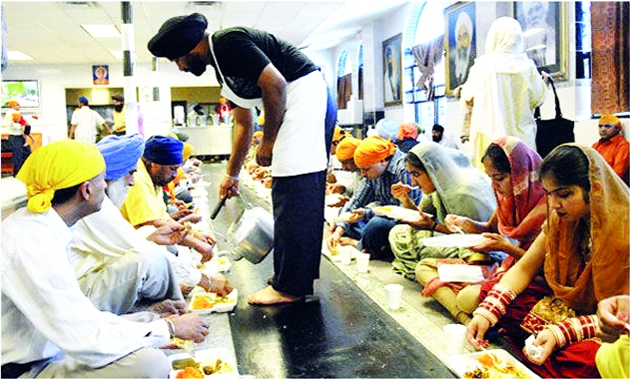Sunil Vaid
Eating together with a group of people is called community feasting. It is a special meal specifically prepared during social gatherings to celebrate or re-enact, ritually celebrate or anticipate events or seasons – agricultural, religious or sociocultural, such periods generally originate in religious celebrations or rituals that include sacred community meals and are called feasts. Let us know about different community feasts in our society which are elucidated below.
LANGAR: In Sikhism, Langar is not just a communal duty but a transformative spiritual institution. It is where tasks such as preparing, serving and clearing dishes are elevated to acts of devotion. In this unique establishment, principles of human parity, honour of labour, communal wellbeing and reverence to the divine conveys, creating a sense of unity and equality that extends beyond the dining table and inspiring all to engage in acts of selflessness.
Guru Nanak Dev Ji initiated this movement to challenge the dominance of the wealthy over the less privileged. Guru Nanak Ji actively endorsed the practice of Langer, which soon became a prevalent tradition. The community kitchen symbolized the bedrock of equal treatment and camaraderie among the Guru’s Disciples. The Gurus demonstrated through their own lives how the concept of universal kinship should serve as the most vivid example of this principle. The Langer extends beyond mere dining, it holds a doctrinal significance uncompressing social engagement, collective involvement and communal obligation to provide sustenance to the hungry, less fortunate and enhance selfless service to the society. Holding of Chabeel, which involve serving people a refreshing, sweetened drink, typically made with water, sugar and sometimes flavoured with rose essence/Roohafza in summers is symbolic act of kindness.
This practice is associated with celebrating Guru Purabs/Nirjala Ekadeshi/Tamdey by both Hindu and Sikhs showing brotherhood, solidarity honoring the Lords/Gurus teachings.
Dhaam (Tam) – Meal at a temple or Dogra get together (sort of Hindus feast equivalent to Sikh Langers). Dhaam which has been named these days as Banquets is a unique local feast organized at the site of pilgrimage, abode, holy site or social get together. People relish Channa Dal, Kaddu Da Ambel, Anardane Di Chuteny, Rajmah Chawal, Gheur, Mithe Chawal, Patta Kulfi, Khatta Kimb, Babru, Kulthein Di Dal, Maa Da Madra, Auriya the unique flavours of Jammu. We are forgetting our traditional flavours and practices but time has come to revive them. In rural fold, they are in still practice and relished by people.
Prasada – Prasada is to be consumed by attendees as a holy offering. The offering may include cooked food, fruits and confectionery sweets. Vegetarian food is offered and later distributed to devotees offering food and subsequently receiving Prasad is central to practice of Puja. Any food that is offered either physically to image of God or silently in prayer is Prasada.
Prasadam or Presedam is a religious offering in our religions. Most often prasada is vegetarian food especially cooked in Community Kitchens for devotees, after prayer and thanks giving to a god. Maha Prasada (also called Bhandaras) is the consecrated food offered to the Deity in a Hindu Temple which is distributed and partaken by all the devotees regardless of any orientation. Prasad is closely linked to the term called Naived. The food offered to the deity is called Naived and sacred food sanctified and returned by Deity called Prasada. Bhandaras with Dogri dishes like, Channa Dal, Rajmah Chawal of Mithe Chawal are organized in rituals like Ram Navmi, Shiv Ratri, during Amarnath Yatra, Vaishno Devi Yatras to feed the needy and seek Gods’ blessings.
Langar (Sufism) – It is also prevalent among Sufi Muslims where by food and drink are given to the needy regardless of social or religious background. Its origin in Sufism are tied to the Chisti order.
Langar is distributed to all in a Langar Khana. In a large dargah there are two degs (cauldrons for cooking food) in either side of court yard lamp.
There in a solid masonry, a palatable mixture of rice, sugar, ghee (butter) and dried fruits is cooked for distribution to the public as Tabarruk. Deghs at dargah of Khawaja Garib Nawaz Ajmer Sharief is worth mentioning.
In our varied society, the community meals are prepared by self-service. All people are given exactly the same food and treated same. The free kitchens are still present in every Guru Dwaras, Balaji, Jagan Nath Puri, Vaishno Devi Dhams and famous Dargahs. The Langars are run by volunteers, who can be male or female. It is seen as a privilege to help with the running of Langar/Dhaam/Prasad Vitran. People help by cooking cleaning or serving the food. This practice reminds us that all people belong to the same human family and therefore should be treated equally. All the food is free, and is offered to everyone. The Langar serves only vegetarian food in order to make it inclusive to all faiths. Different faiths have different food laws. For example, Muslims are to eat Halal only and cannot eat pork.
Community feasts whether religious or secular, national or local, serve to meet specific social and psychological needs and provide collectiveness to social institutions: e.g., Temple, Gurudwara, Dargah, Church, state and esoteric or social nonaccepted groups. The cohesiveness engendered in the Langers/Dhaams/Prasads/Feasts reflect brotherhood, kindness to needy, devotion to God and unity in Diversity as there is no discrimination of caste/creed/religion in our traditions. These Biblical feasts are opportunities for deeper communion and blessings where God could interact with his children more intimately. The gurudwaras, temples, Darghas, and religious/socio organization are regularly engaged in providing the Langar/Prasad facilities to all.
Langar is one such practice based on principle of inclusion of unity in the religious sphere that helps everyone and anyone in times of hunger. Besides the virtue of sharing the concept of Langar/Prasad/Dhaam also teaches equality and love/kindness.
“One who performs selfless service, without thought of reward shall attain his Lord/Master”. GURU GRANTH SAHIB
Trending Now
E-Paper


